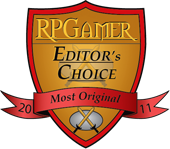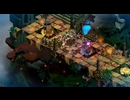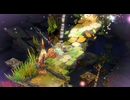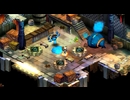
Most Original

Second Place

Third Place

|
There are no new stories, right? Everythingís a sequel, remake, or straight-up port. Anything else that manages to squeak through is a rip-off of last yearís hits or slavishly pandering to an increasingly specialized fan base. Thatís how the industry can seem, at least. Luckily, several games this year gave the cynics food for thought. They gave us new looks at old themes, fresh ways of looking at what was previously commonplace, and a few surprises as well. No game exists in a void free of all outside influence. Moreover, any truly original RPG would shatter the boundaries of the genre or be utterly unrecognizable. That said, these games are something else.
A proper story's supposed to start at the beginning. Take Bastion. The gruff narration guides the Kid through his collapsing world. He's the first introduction to Caelondia and he never lets up. In lesser games, a companion this constant could be contrived or overbearing. Here, he points out everything worth knowing with a steady stream of encouragement, wry humor, and pathos for a destroyed world. It's an uncommon voice that can do that, so you take them where you can — even if you can only trust 'em as far as you can throw 'em.
The good thing about trust's that it leaves room for a weapon in each hand. Although Bastion's basic action-RPG mechanic of blocking and dodging isn't new, the interplay between different weapons adds welcome diversity. The weapon balance ensures experimentation rarely gets in the way of progress: it's more about finding the tools to fit one's personal style and experiencing the story on one's own terms.
The story never hovers in one place long enough for the player to piece together too much about life before the Calamity. Instead, it hints at fragments to eulogize a frontier that draws on elements of science fiction, fantasy, and westerns to create something unique. Real-world concerns of empire and cultural conflict make their voices heard, but never overpower the balance of inspirations. The contrast between the narrator's carefully selected commentary and the player's own silent observation create an apocalypse that's alternately chilling, mysterious, and exciting. The vibrant graphics and
top-notch soundtrack focus on the lost beauty of the world that was, encouraging the player to recreate the lives of the civilization that created such compelling ruins and uncommon songs.
Initially, most of us assumed that Fate/Extra was simply a Persona 3 clone due to its school setting and dungeon crawling template, but those who dove in quickly found that this game is more visual novel than social sim. Along with that, the game blends the anime setting of the Fate series with unique historic references. Radiant Historia suffered from similar assumptions with its comparisons to Chrono Trigger. Instead of offering time travel as a means of jumping between eras, it instead works as a means to allow us to go back and change the past when things didn't quite go as we planned. An inventive battle system that takes some thought and planning also showcases originality where many RPGs would just copy and paste mechanics.



by Zach Welhouse and Michael Cunningham
|









